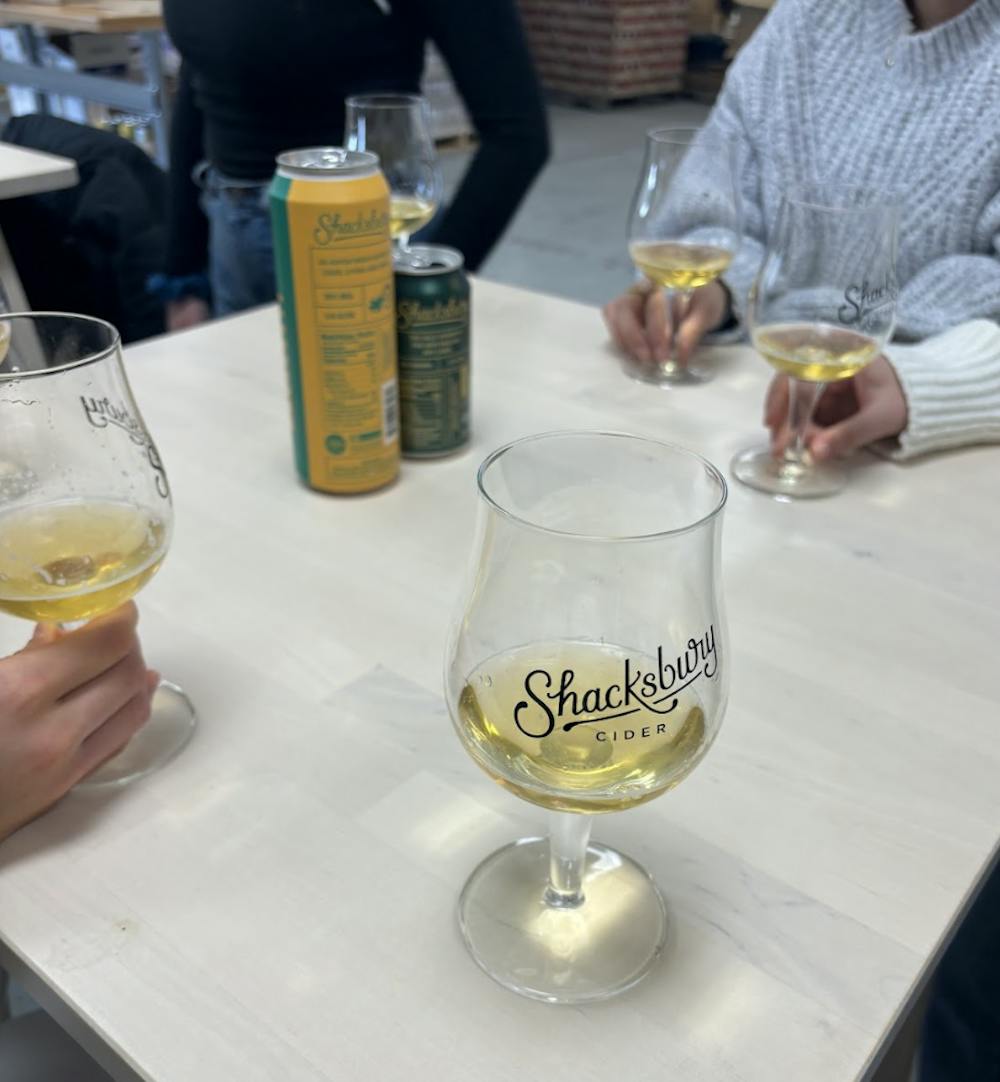Since David Dolginow ’09 and Colin Davis ’03 founded Shacksbury Cider in 2013, they have been focused on crafting dry, easy-to-drink ciders that highlight the full, complex flavors of the apples from which they are made.
The pair first met through a mutual friend who was also a cider enthusiast. They were inspired by the robust and complex ciders coming out of Europe as well as unique hard ciders in Vermont. Dolginow cited the wild apple cider made by Michael Lee of Twig Farm in Cornwall, Vt. as well as family-cider made in a ginger-aged barrel by Erlé Labounty in Bristol, Vt. The sale of Woodchuck Cider in Middlebury in 2012 to C&C Group for over $300 million solidified the appeal of cider as an attractive market to enter.
“We were finding these beverages that really inspired us that were really tasty but not readily accessible,” Dolginow said. He and Davis were ready to bring a unique, more dry cider to the market.
Dolginow was first exposed to agriculture — apples specifically — while a college student, when he worked at Cornwall, Vt.-based Sunrise Orchards, owned by Middlebury alumnus Barney Hodges ’91.
At Shacksbury, Davis and Dolginow found a natural division of labor.
“One thing that really has helped our partnership work well was we have different interests and skill sets, so [Davis] was really interested in the production side and operations, and I was much more interested in the sales side,” Dolginow said.
Shacksbury initially began with a focus on European-style ciders sold in glass bottles before transitioning to canned ciders in 2018. Although the cider production process is similar to wine, it largely follows the distribution channels of beer in the U.S. Selling in can and keg formats made it possible for Shacksbury ciders to be distributed more widely.
“Transitioning our entire distribution network from wine to beer was incredibly challenging. And had we not been able to do it, eventually, we wouldn't have survived,” Dolginow said.
Since its founding, the team has grown to about 17 employees in their cidery facility in Vergennes, Vt. Dolginow enjoys seeing team members grow and succeed in their roles.
The company moved to a larger space on Meigs Road in Vergennes in early 2020, right before the Covid-19 pandemic. Expanding from a 7,000 square foot to 30,000 square foot facility and bringing production in-house was a challenge especially as the cornerstone of their market, sales at various establishments in New York City, completely shuttered.
As Shacksbury weathered the pandemic, they used the space both for in-house production and for co-packing. Co-packing is a service in which Shacksbury uses its canning line to package and can for other brands, including Chug Water, Savouré soda and other local products.
“We're continuing to expand production capacity, which is great,” Dolginow said. He added that Shacksbury recently purchased a new filler and runs a canning line from Colorado-based CODI Manufacturing.
Shacksbury has developed several unique cider flavors in addition to more traditional cider flavors, including yuzu ginger and a rosé cider.
“New products are always fun,” Dolginow said.
The team is currently working on its next seasonal release.
“We’ve concocted a cider — we're just calling it our spritz — which is inspired by aperol spritzes, and it tastes awesome and it looks great,” Dolginow said.
Canning the spritz will happen in late April for a seasonal summer cider. “It's very refreshing looking, that beautiful red or orange and ice-cold and crisp, sweet, bittersweet,” Dolginow said.
A new product typically takes a year to develop end-to-end. The team previously developed a version of a spritz-inspired cider back in 2017 at the same time as its rosé cider. Because the rosé cider happened to coincide with a broader trend of rosé-inspired drinks exploding in popularity during that time period, Shacksbury decided to delay the spritz as the rosé took off.
Sampling the cider at-home for the first time right before an impending release is one of Dolginow’s favorite moments in the process. He appreciates the moment of early appreciation when the first run of the cider has been produced and he can enjoy the experience of sipping on the first 12 oz. can at home just ahead of customer responses.
Dolginow has especially appreciated the opportunity to be an entrepreneur in Vermont.
“As a Middlebury alum from the Midwest, I didn't really ever think about staying in Vermont as a viable path up until like my senior year. But I think for some people, there's some real opportunities here in this state. It can be a wonderful place to live,” Dolginow said.

Olivia Mueller '24 (she/her) is a News Editor.
Previously an Arts and Culture editor, Olivia is an International Politics and Economics major with a Spanish minor. Outside of the Campus, she is a spin instructor for YouPower, an avid runner and hiker, and a member of the Middlebury Mischords a cappella group.




